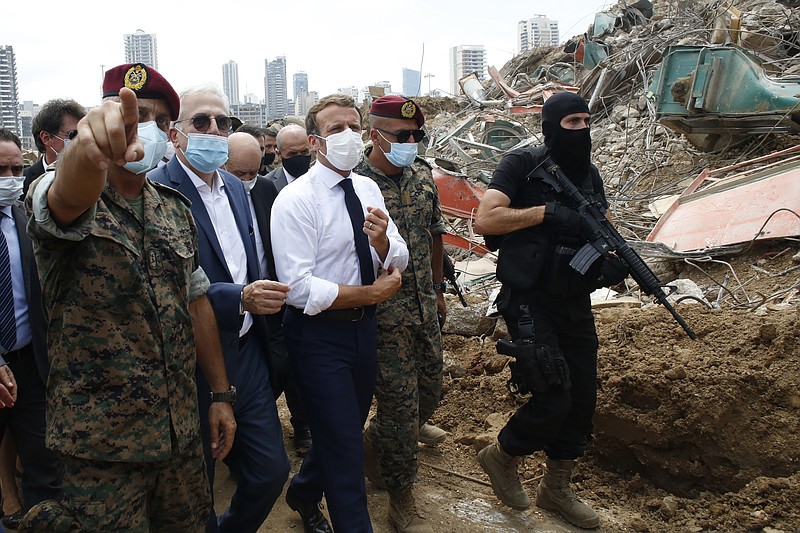BEIRUT -- Residents of Beirut vented their fury at Lebanon's leaders Thursday during a visit by French President Emmanuel Macron, blaming them for the deadly explosion that ravaged the capital. Shouting "Revolution!" they crowded around the visiting leader who promised to press the politicians for reform.
A military judge leading the investigation into Tuesday's blast said 16 employees of Beirut's port, where the explosion took place, had been detained. He said 18 had been questioned, including port and customs officials, according to the state news agency.
But while investigators focus on port officials, many Lebanese put the blame squarely on the political elite and the corruption and mismanagement that even before the disaster had pushed the country to the brink of economic collapse.
The Cabinet was previously warned by a security agency that a stockpile of explosive chemicals stored at the port was dangerous, Lebanon's customs chief told the Associated Press -- a report that could raise questions of high-level neglect.
That stockpile of 2,750 tons of ammonium nitrate set off the massive blast, apparently when touched off by a fire at the port. The chemical had been left sitting in a warehouse ever since it was confiscated from an impounded cargo ship in 2013.
The explosion, powerful enough to be felt in Cyprus across the Eastern Mediterranean, killed more than 130 people, wounded thousands and blasted buildings for miles around. Two days later, some 300,000 people -- more than 12% of Beirut's population -- can't return to their homes, officials estimate. Damaged hospitals are still struggling to deal with the wounded. Dozens are still missing. Officials have estimated losses at $10 billion to $15 billion.
Furthermore, the disaster struck at a time when people's savings have melted away, and unemployment and poverty have mounted in the financial crisis. Few have capacity to rebuild homes and businesses, and the government is scraping for dollars.
After talks with Lebanese leaders, France's Macron announced his country will organize a conference in the next few days with European, American, Middle Eastern and other donors to raise money for food, medicine, housing and other urgent aid.
But he warned Lebanon's political elite that he wouldn't give "blank checks to a system that no longer has the trust of its people." He called on them to create a "new political order."
He promised a "clear and transparent governance" so that the aid goes directly to the population and aid groups.
In startling scenes, Macron -- whose country once was Lebanon's colonial ruler -- presented himself as a champion for the Lebanese to push change on their leadership.
After visiting the devastated port, Macron walked through one of the worst-hit neighborhoods, Gemmayzeh, down a street lined with wrecked buildings.
On the narrow street, a crowd gathered around him and shouted their anger, chanting, "Revolution!" and "The people want to bring down the regime!" -- slogans used at mass protests last year.
Macron told them he would propose "a new political pact" when he met the government later. Then, he added, "I will be back on the first of September and if they can't do it, I will keep my responsibility toward you." He also promised that French aid would be given out with transparency and "will not go into the hands of corruption."
One woman shouted at Macron, "You are sitting with warlords. They have been manipulating us for the past year." He replied, "I'm not here to help them. I'm here to help you." They then hugged.
Notably, none of Lebanon's top politicians have toured residential areas damaged by the blast, though President Michel Aoun and others did visit the port. Hours after Macron left Gemmayzeh, Justice Minister Marie-Claude Najm tried to visit, only to be driven out by protesters.
By Thursday evening, after Macron left Lebanon, dozens of protesters held an angry rally in central Beirut, on the roads leading to the government building and the parliament -- pelting security forces with stones, setting tires on fire and shouting against the political elite. The security forces pushed them back, eventually firing a few rounds of tear gas to disperse the crowd.
Beirut's hospitals remained overwhelmed by the wounded, and there were fears of a spike in coronavirus cases.
In one hospital, 4-month-old Sophie Ajoury, perhaps the smallest survivor of Tuedsay's blast, was fighting for her life. She suffered head injuries while breastfeeding from her mother near a window with the shock wave hit.
Her nurse said external bleeding had stopped, and the baby girl was awake and eating, and they were monitoring her condition for internal bleeding.
Emergency aid was starting to come into Lebanon, with European, Arab and Asian countries sending doctors, medical supplies or field hospitals. The United Nations said Thursday it was releasing $9 million from its emergency fund for Lebanon to strengthen hospitals and intensive care units.
However, the international community has been reluctant in past years to offer support to the notoriously dysfunctional government.
The same factions -- and in most cases the same figures -- have ruled Lebanon since the 1975-1990 civil war, including Iranian-backed Hezbollah. Almost all public institutions are divided up among the factions, which use them as patronage generators for themselves and their supporters. That means they tend to turn a blind eye to corruption, petty or major, and little actual development is put into the institutions. Even basic services like electricity and trash collection are a shambles.
